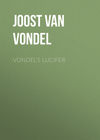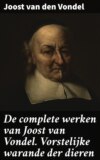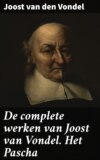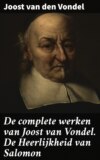Kitabı oku: «Vondel's Lucifer», sayfa 6
In his fiery patriotism Vondel much reminds us of Milton. He also was at heart a zealous republican, though he had a Christian's unshaken reverence for the anointed kings of earth, and for what he thought a God-constituted authority. Hence the "Lucifer," and his relentless opposition to the regicides of England and to Cromwell, "that murderer without God and shame, who dared to desecrate and to assault the Lord's anointed," as he says bitterly in one of his polemics.
Like the great Englishman, the Hollander was also a good hater; and he never spared what he hated. Though charitable, he was uncompromising, and forgave not easily; always, however, deprecating the excesses of the "root and branch" zealots of his own party. Just as Milton, after having joined the Presbyterians, forsook them when they in turn began to persecute the followers of other creeds, so, too, Vondel left the Remonstrants when they crossed the jealous line of freedom.
We are indeed inclined to believe that his strongest trait was his love of justice, which caused him to oppose tyranny under every guise, and to stigmatize the faults of his own church and party with expletives as crushing as those that he hurled against his enemies.
Thus his hatred of the Catholic Spaniards and of the Dutch Gomarists. The bloody persecution of the one was in his eyes no worse than the oppressive hypocrisy of the other. Even his beloved House of Orange drew from him the bitterest opposition when, in Prince Maurice and in William II., it threatened the liberty of his country and the privileges of his beloved Amsterdam. Of him it may truly be said that his eyes were never blinded by party prejudice.
Milton, in an immortal sonnet, blew a trumpet-blast of vengeance for the slaughtered Piedmontese. Why was that trumpet silent w hen his own party perpetrated a similar massacre at Drogheda? Vondel was, indeed, far more magnanimous than his great English contemporary. He had more of "the milk of human kindness."
How strong is our poet's admiration for the founders of the Republic, the fathers of the "golden age," and for that grand race of intrepid discoverers, pioneers, and explorers that pierced every corner of the globe! How, too, flames his soul with pride, when he recounts the brave deeds of those old sea-lions, Tromp and de Ruyter, and their fearless companions, in the fierce battle against the growing English supremacy! Not one of those heroes whom he did not crown with the wreath of an immortal eulogy!
Yet Vondel, even as Dante, was at heart a man of peace. Like his countrymen, he never sought the fray; but when battle was forced upon him, it meant a fight to the death. All his fighting was for peace. In one of his poems he speaks of peace as:
"A treasure—Ah! its worth unknown,
Surpassing far a triumph in renown."
Elsewhere he says, "The olive more than laurel pleases me." He never forgot the high seriousness of his mission. He never lost sight of the dignity of Christian manhood.
Vondel was in a large sense also the poet of Christendom; a crusader, with his face ever towards the New Jerusalem, throned in ethereal splendors. He felt himself a member of that large Christian alliance that Henry IV. wished to found as a barrier against the encroachments of the Turk, the arch-foe of Christendom.
"He comes—the Turk! We stand with winged arms,"
he shouts in one of his poems. Yet he never forgot to pray, also, that the erring ones, both Jew and Gentile, might be brought into the fold of the "true Church."
HIS VIEWS ON LIFE
Of particular interest are the views of so old and so profound a seer on life; for every poet has his scheme of life. What men call genius is, indeed, only the faculty of seeing life through the prism of a temperament, and the poets are preëminently the men of temperament. Vondel, with his earnest, sincere nature, out of the bewildering chaos of his environment soon evolved his own philosophy of existence. "Life, that sad tragedy," the youthful poet calls it in his "Passover." To him already life was a passing pageant, and man, an exile. His epitome of the world's history, moreover, is not unlike the celebrated epigram of Rhÿnvis Feith, another Dutch poet:
"Man, like a withered leaf, falls in oblivion's wave.
We are, and fade away—the cradle and the grave;
Between them flits a dream, a drama of the heart;
Smart yields his place to Joy, and Joy again to Smart;
The monarch mounts his throne; the slave bows to the floor;
Death breathes upon the scene—the players are no more."
His gaze, like Milton's, was ever upward, through the prison-bars of time, into the unconfined vast of eternity. His tone, too, was most glorious when singing "celestial things."
How like the voice of a Hebrew prophet his note of warning, where he cries:
"Batavians, repent;
Think of Tyre and Sidon.
Repent as the Ninevites!
O! mourn your sins!"
And after all this painful revelry of life, this lust of action, and the battle's roar, it is a "haven sweet and still" that his earth-tormented soul longs for. How softly he whispers after his fiery trumpet tones are done:
"O! help me, O my God, to give my life to thee,
My fragile self, my will, my little all. Let me,
O thou beyond compare! O source of everything!
In praises rich and deep thy matchless glory sing!"
In the pensive twilight of old age, he grew more and more conscious of the true everlasting, and his patriotism became the all-embracing one of the "fatherland above." He now began to look forward with child-like faith to the revelations of the resurrection, though not forgetting that:
"The infant of eternity
Must first be cradled in the tomb;"
but believing that from the cerements of mystery shall break a light to lead the soul to heaven.
HIS PLACE AND ART
Vondel, to an extraordinary degree, possessed that keen insight into human nature which is the first requisite of the great satirist. He was the Juvenal of his time. Though his wit is never delicate nor keen, it is, however, sweeping and irresistible. His was no gentle zephyr of irony to tickle the tender cuticle of a supersensitive age, but a very cyclone of mockery to laugh a thick-skinned generation out of folly.
His poetry is ever the instrument of exaltation; and though in its condemnation of evil it often by its directness and frankness gives some offense to the delicate edge of our modern refinement, it is never indecently coarse; it is never a pander to vice.
Indignation more intense, scorn more contemptuous, satire more powerful, invective more tremendous than that glowing in the polemics of this great satirist have never struck fear into the hardened hearts of the wicked. Few men have been so hated; few have been so loved.
Yet the sublime is the true field of this poet, and sublimer thoughts than his were surely never spoken. The grandeur of Job, the glory of the Psalms, and the splendor of the Apocalypse are all to be found in his magnificent Biblical tragedies, that noble series commencing with the "Jerusalem Desolate" of his untried youth, and ending with the "Noah" of his octogenarian ripeness.
The influence of the Bible on his art was prodigious. The Holy Writ was the inexhaustible quarry from which he hewed his master, pieces; throughout whose development may be traced the growth of a human soul. See his paraphrase of the Psalms, if you would know his enjoyment of the serene beauty of holiness.
The artistic truth of all his creations is seen in their elemental objectivity—the portrayal by vivid flashes of feeling and by artful representation of the ever-during and imperishable. In most of his dramas is the sublimity of Æschylus with the fine proportion and the directness of Sophocles. In others, as in the "Leeuwendalers," where he sings the triumph of peace, is the sweetness and the feminine strength of Euripides.
Of Vondel it has truly been said: "Nihil tetigit quod non ornavit;" for to beauty—
"God's handmaid, Beauty,
Whose touch rounds
A dew-drop or a world"—
he ever paid the incense of a passionate devotion.
"Æschylus does right without knowing it," said Sophocles; even so Vondel possessed an unerring instinct for the true; ever stringing the jewelled beads of fancy on the golden thread of truth.
Like Æschylus, too, he was at heart a lyric poet; yet who shall say that in his character delineation, in the sweeping energy of his action, and in the management of his plot, he was not almost equally as admirable?
Like Dryden, Vondel rose very slowly to the stature of his full power. All of his dramas preceding the "Lucifer" show this gradual development; all of those that come later maintain the same standard of excellence.
Like Goethe, the Dutch poet exerted an ennobling influence on the theatre of his country. Like Dante, he was fond of a strong, bold outline, and always chose a direct rather than a circuitous route. Like Shakespeare, he was a keen observer of affairs, a student of life. His works are the rimed chronicles of his age. His was a transcendent genius, not oppressed by excessive culture, and with the creative ever the ruling instinct. To him poetry was the divinest of the arts. It became the ritual of his soul's worship; duty, beauty, and religion were the three strings on his melodious lyre.
His works abound in little scholasticism. Pedantry and affectation were his abomination; pith and vigor, directness and comprehensiveness, the radical elements of his strength. In his works we find a harvest of such glorious themes as store the granary of poet minds; we see everywhere evidences of power. We are ever startled by:
"The lightning flash of an immortal thought,
The rolling thunder of a mighty line."
Vondel's similes are more striking than his metaphors; there is a sustained glow in his imagery. In this respect, also, he shows the Oriental bent of his genius. This is furthermore seen in his personification of the elements of nature and of the stars and constellations, as in the "Lucifer," which gives a barbaric splendor to the play. Few poets, indeed, in any literature, contain such splendid and elevated images.
He, too, could woo discordant sounds to harmony, and wove the consonantal Dutch into mellow meshes of ensnaring sound. A nobleness not devoid of grace, a sublimity not austere, but warm with human sympathy; a manner more remarkable for chaste strength and a rugged symmetry of form than for delicacy or elegance—these are some of the characteristics of his style.
Not for him the sweet felicities of the mincing phraser or the dreamy languors of the riming troubadour. Not for him the gaysome zephyr or the dim, romantic moon. He is ever on the serene altitude of lofty contemplation, or in the valley, battling like a god. He is always deeply serious. He is everywhere sincere. His is the whirlwind and the storm; the noonday glare and the midnight gloom. His is the eagle's bold, epic flight and the lark's wild, lyric soar. No nightingale of sentiment trills her dulcet serenade amid the forest of his song. And yet who can be more tender and affecting, who more truly, softly sweet? All is virile; nothing is effeminate. All is manly, healthful, pure. There is no morbid fever of a brain diseased and foul. There is no pale, misleading will-o'-the-wisp of a heart decayed and bad. There is freshness, there is beauty, there is truth. "Magnificent" is the one word for his manner, "the grand style" of the Netherlands.
His was the sombre Occidental imagination fired with the splendor of the Orient. His poetry is a Gothic cathedral, grand, towering, and impressive, typical at once of the massive ruggedness of the oak and the severe sublimity of the Alp; a Teutonic temple, in whose cloistered corridors we hear the majestic sweep of unseen angels' wings, while the glorious symphony of harps and psalteries, played by countless cherubim, mingling with the rich bass of the organ and the ethereal tenor of invisible choristers, rolls like a flood of celestial harmony through all the deep diapason from heaven to hell.
The word "vondel" in the Brabantian dialect means a "little bridge," which suggests a not inapt analogy; for it was Vondel who bridged the chasm between the crude Mystery and Miracle Plays of the Chambers of Rhetoric, and the "Lucifer," a drama unequalled in the history of Dutch literature. Between the dead abstractions of the Chambers and the warm, concrete life of the sublime Vondelian drama, even as between "Gorboduc" and "Hamlet," lay the experience of one soul.
Hooft, like Heiberg in Denmark and Lessing in Germany, instituted a revolution in the world of taste. But Vondel, even more than Hooft, developed the latent powers of the tongue, enlarged its resources, and fixed its form. His is still the noblest of Dutch diction, possessing that strange virility that defies time.
At the beginning of the century the language was hardly fit for literary use. The school of Vondel in one generation—the first half of the seventeenth century—did for Holland what the thirteenth century had done for Italy and the sixteenth for England. Vondel, no less than Shakespeare, was the creator of an epoch. His influence on his own language was equally as wonderful, his impress on his country's literature almost as great.
To him the poets of the following generations, even the great Bilderdÿk, looked for inspiration. To him also they have ever paid homage.
Like Homer, he also found his Zoilus, but the greatest intellects of his country and his age—and surely few epochs have seen greater—Grotius, Hooft, Vossius, Huyghens, and scores of others of almost equal fame thought him not inferior to the noblest poets of antiquity.
Vondel lived in a memorable epoch and was its personification. It was the Augustan Era of Holland, the Dutch Age of Pericles. Amsterdam, like another Athens, had become the centre of the world's civilization. Nowhere in that age were the arts so sedulously cultivated; nowhere had their cultivation been rewarded by such high attainment.
Science, the world puzzler, opened his toy-box, the universe, and showed its countless wonders. Philosophy, with guessive hand, played at the riddle Destiny, and mild Religion, at the game of War. Literature, the sum of all the arts and all the sciences, shone like the dazzling Arctic sun in its brief midnight noon—one hour of glory in a day of gloom. When the poet died, the epoch died with him. A night of mediocrity now brooded over the marshy fens of Holland. A swarm of poetasters succeeded the race of poets. Originality was banished. Affectation, with his sycophantic wiles, had won the heart of a degenerate generation. Art, like a flower suddenly deprived of the warm kisses of day, pined away in the sterile cold. Genius was dead.
Vondel is preëminently the poet of freedom. The principles sanctified by the blood of his countrymen, and won by nearly a century of the most noble daring and heroic endurance, he, as the voice of his nation, glorified in his beautiful pastoral, the "Leeuwendalers." These same principles also became the rallying shout of the English Revolution of 1688. That same war-cry, reechoing at Lexington and Alamance, swept the American Colonies from Bunker Hill to Guilford Court House like a whirlwind of flame; and tyranny, with shuddering dread, fled to its native lair.
The shibboleth of liberty, first blown with stirring trumpet tones across the watery moors of Holland by the patriot-poet Vondel, was now repeated in deathless prose at Mecklenburg and Philadelphia. A new United States arose like a glorious phoenix from the ashes of the old.
For the American Constitution was but the grand conclusion of that lingering bloody syllogism of freedom, of which the Treaty of Munster was the major premise. And Vondel, inspired logician of the true, unravelling the tangled skein of his country's destiny, also uncoiled the golden thread of our great fate.
Of his magnificent works, the natural heritage of the American people, we here present this choice fragment, the "Lucifer," aglow with the eternal spirit of revolt.
And now we leave our poet. A spotless name, the record of a noble, sacrificing life, a message of beauty, and a treasury of immortal truths—this was Vondel's legacy to his countrymen.
L.C.v.N.
The "Lucifer."
"Away, away, into the shadow-land,
Where Myth and Mystery walk hand in hand;
Where Legend cons her half-forgotten lore,
And Sphinx and Gorgon throng the silent shore."
THE PARADISE HISTORY
The Paradise history, as solving the problem of the origin of man and the origin of evil, and as foreshadowing the goal of human destiny, has always been a subject of universal concern; one full of fascination for the imagination of the poet. Few subjects, indeed, have aroused such widely diffused and long sustained interest.
Beginning with the "Creation" of the Spanish monk Dracontius, the Biblical paraphrases of the old English poet Cædmon, and the Latin poem of Avitus, Bishop of Vienna, we see, at different periods, various studies of this absorbing theme, especially in Italy, where a score or more poets and essayists made it the source of their inspiration.
Perhaps the most noted of these was Andrieni (1578-1652), who wrote the "Adamo," a tragedy in five acts, whose subject is the fall of man. This drama, however, is a rather crude affair, such allegorical abstractions as Death, Sin, and Despair being the chief characters.
About the same period, strange to say, the Netherland imagination, not long awakened from its medieval torpor, also became fired with this theme. The youthful Grotius was the first to attempt it in his "Adamus Exul," a Latin drama of considerable merit. This was in 1601, several years before the "Adamo" of Andrieni. Two other Dutchmen of the same generation, both far greater poets than Grotius, were also attracted by this subject. One was the distinguished Father Cats in his idyll, "The First Marriage;" the other was Justus van den Vondel in his "Lucifer."
We would, in passing, call attention to the curious coincidence that so many poets of so many different nations, most of them doubtless without knowledge of the others, should about the same time have chosen this subject of such historical and symbolical importance. For besides the poets mentioned were many others: the Scotchman Ramsay, the Spaniard de Azevedo, the Portuguese Camoens, the Frenchman Du Bartas, and two Englishmen, Phineas Fletcher and John Milton. A more remarkable instance of telepathy is not, we believe, on record.
Of all of the works of the many authors who have treated this theme, only two, however, have withstood the critical test of time; only two have been awarded the palm of immortality. These two are Milton's "Paradise Lost" and Vondel's "Lucifer": the former, the grandest of English epics; the latter, the noblest of Dutch dramas. It is the "Lucifer" that we have been asked to discuss.
DID MILTON BORROW FROM VONDEL?
The "Lucifer" was published thirteen years before "Paradise Lost." The scheme of the English poem had, however, already been crystallized in the mind of its author for fifteen years. This scheme originally contemplated a drama, which the poet's powerful imagination gradually developed into an epic.
To whom Vondel was indebted for the foundation of his tremendous drama is easily ascertained. He himself mentions his authorities in his admirable and learned preface. Among these were, besides the Holy Writ, the various Church Fathers, the "Adamus Exul" of Grotius, the work of Du Bartas, and a treatise on the fallen angels, by the English Protestant, Richard Baker. His own imagination, however, soared far above the fundamental hints that he received from any of these works on the subject, so that the "Lucifer" is rightly considered one of the most original and comprehensive poems in literature.
To whom Milton was indebted for the idea of his great epic is, on the other hand, not so easy to discover, although generation after generation of critics have thrown upon this problem the searchlight of innumerable essays.
That the "Paradise Lost" is scintillant with many of the brightest gems in the crown of the Greek and Latin classics is apparent even at a cursory reading. That it is also studded with poetic paraphrases of many modern authors has often been asserted.
However, the opportunity for originality was colossal, and Milton's imagination proved equal to the task. The conception of "Paradise Lost" alone makes it the grandest work of the imagination of modern times.
That the English poet occasionally borrowed a thought or a sentence can not be doubted. Besides, he had a wonderful memory, long and tenacious, which involuntarily emptied its gatherings into the flow of his thought and into the stream of his discourse. That this was not always done unconsciously is known from Milton's own confession, where he says: "To borrow and to better in the borrowing is no plagiarie." And that he bettered in the borrowing who can doubt? All that he touched turned to gold; all that he thought came out transfigured. In the alembic of his genius truth became beauty; the mortal, the immortal.
As the "Lucifer" and the "Paradise Lost" are both concerning the same subject, and as they are both founded upon the Biblical account of the creation, it is but natural that they should have much in common. A comparison of the two poems, therefore, we feel sure would bring to light some striking and curious resemblances and many equally strong and remarkable contrasts.
As such comparison would expand this article beyond the prescribed limits, we must leave it to the reader himself. Nor should he, for one instant, forget the fundamental difference between the drama and the epic.
The epic may wander through the dales of Arcady, along description's slow, meandering way, to pluck the roses of beauty and the lilies of sentiment there growing in so sweet abundance. The drama, with vigorous step and bold, unerring eye, pursues a straight path to the mountain-top of its climax, whence, with increasing momentum, it plunges down to its awful catastrophe. It is the difference between narration and action.
We shall have to content ourselves, therefore, by a brief reference to those who have already given this matter their attention.
That Milton was under great obligations to Vondel's drama has been maintained by Dutch men of letters for generations. It has also become the contention of several distinguished English critics. Even as far back as 1825 the poet Beddoes, in a review of "Hayley's Life and Letters" (Quarterly Review, vol. xxxi.), says: "An effect which has hitherto not been noticed was then produced by the Dutch poets. In their school Joshua Sylvester (who lived amongst them) learnt some of the peculiarities of his versification; and if Milton was incited by the perusal of any poem upon the same subject to compose his 'Paradise Lost,' it was by studying the 'Lucifer' and 'Adam in Ballingschap' of Vondel, for he tried his strength with the same great poet in the 'Samson Agonistes;' Vondel being, indeed, the only contemporary with whom he would not have felt it a degradation to vie."
Mr. Edmund W. Gosse, in a brilliant essay entitled "Milton and Vondel," was, we believe, the first Englishman who gave the subject conscientious study.
For this, on account of his knowledge of the difficult Dutch language, he was peculiarly fitted. Mr. Gosse, in his own interesting manner, tells how, during the seventeenth century, the Dutch, then one of the most vigorous languages of Europe, was much more studied than it is to-day; how the patriot Puritan, Roger Williams, having learned the language in Holland during his exile there, taught it to John Milton, then Cromwell's Latin secretary; how Milton also must have heard of the great fame of the "Lucifer," and of the storm of fanatical opposition that greeted its publication, from some of the Dutch diplomats whom it was his place to entertain; how, too, he could hardly have been ignorant of the name of the distinguished author of the drama, since it is known that he was well acquainted with Hugo Grotius, who was a warm admirer and the bosom friend of Vondel.
In addition to these and other reasons, Mr. Gosse then brings forward a plausible array of internal evidence, showing many points of similarity in the construction and in the treatment of the two poems, summing up with the conclusion that Milton was undoubtedly under considerable obligation to his great Dutch contemporary.
Rev. George Edmundson, M.A., of Middlesex, England, a graduate of Oxford, in a scholarly and painstaking work of two hundred pages, entitled "Milton and Vondel—a Literary Curiosity," next took up the subject, carrying the comparison not only into these two poems, but into all the works of Milton and into several others of Vondel.
Mr. Edmundson also discovered many wonderful coincidences and innumerable parallelisms in phrase and in imagery. Inspired with the motto, Suum cuique honorem, he has woven a tissue of most ingenious arguments to prove that Milton borrowed assiduously from the "Lucifer," the "Adam," the "Samson," and other works of Vondel.
Mr. Vance Thompson, in the New York Musical Courier of December 15, 1897, has also added some interesting data to the subject.
With all the conclusions of these gentlemen we are not yet, however, prepared to agree. It is true we have not given the matter the comparative study that they have given it. We would wait, therefore, until we had thought more deeply about it before expressing our final opinion. However, we believe that a critical and impartial comparison of the two masterpieces will neither detract from the glory of Milton nor dim the grandeur of Vondel.
THE SCENE OF THE PLAY
"Lucifer" is not the story "of man's first disobedience," though this is the outcome of the catastrophe. It is the drama of the fall of the angels. Yet man is the one subject of contention. Our first parents are, therefore, kept in the logical background of cause and effect. The creation of Adam, his bliss and his growing eminence, were the prime cause of the angelic conspiracy. The two-fold effect of the revolt was to the rebellious angels loss of Heaven, and to Adam loss of Eden.
Vondel, moreover, follows the doctrines of certain theologians that Christ would have become man even had Adam not sinned. Like Milton, he measures the scene of his heroic action with "the endless radius of infinitude," and by the artful use of terrestrial analogies conveys to the reader that idea of incomprehensible vastness that the transcendent nature of the subject demands. Vondel is, indeed, even more vague; the drama not giving opportunity for detailed description. Both are a wonderful contrast to the minute visual exactness of Dante.
The attempt to reconcile the spiritual qualities of the divine world with the physical properties of this, necessarily introduces some unavoidable incongruities. How can a material conception of the immaterial be given save through the symbols of the real! How else can the unknown be ascertained save through the equation of the known! How else, save by visual and sensuous images, express such impalpable thought!
"Thus measuring things in Heaven by things on earth,"
the poet gives us a finite picture of the infinite; a picture which yet, by means of shadowy outlines and an artistic vagueness, impresses us with the awful sublimity of the illimitable and eternal. The physical immensity of the poem is unsurpassed.
Humanized gods and Titanic passions shadowed by fate upon the immaculate canvas of sacred legend—this is the play. The personality of the author is never seen; yet when we know the man and his life, we cannot but see therein the reflex of his own experience. The scene is in Heaven and never leaves it. When actions occur elsewhere, they are described.
Infinities above the scene of contention, far beyond "Heaven's blazing archipelagoes," where no imagination dares to soar, reigns He
"Before whose face
The universe with its eternity
Is but a mote, a moment poised in space."
There
"Stand the hidden springs of life revealed,
The wondrous mechanism from earth concealed.
There Nature's primal premises appear
In simple grandeur, deep and crystal clear,
Flowing from out the heart of boundless ocean
Of the eternal Now. With rapt devotion
A myriad ministering forces there await
The summons of His awful eyes of fate,
The mandates of His all-compelling voice."
Far, far below those empyrean vaults is Earth, with its pristine inhabitants. God and man—the Creator and the thing created, the First Cause and the last effect—are both judiciously only introduced into the drama by hearsay.
Deep in the vague immensity lies Chaos, the uninhabited, through which the vanquished rebels are to be hurled to their endless doom.
But the poet also takes us
"Where meteors glare and stormy glooms invest;"
as, leaving Elysium's fields of light, he views
"Hell's punishments and horrors dire,
Its gulfs of woe and lakes of rayless fire,
Where demons laugh and fiends and furies rage
Round writhing victims whose parched tongues assuage
No cooling drops of hope."
Such is the grand perspective from the scene of this stupendous drama.
THE PEACEFUL JOYS OF PARADISE
The play opens as softly as the opening strains of some grand oratorio. The first act is largely descriptive, a picture of the beautiful serenity of Heaven and of the joys of Paradise.
Belzebub, the second devil, first comes on the scene, and, as he stands upon those "heights flushed in creation's morn," by means of a few words, vibrant with suggestion and of far-reaching import, he at once gives us the key to the opening situation, indicating the relative positions of the two chief personages of the drama—the antithesis of Lucifer and Adam.
Apollion has been sent below to gain some tidings of the new race of earth. With speedy wings he soars back through the blue crystalline and past the wondering spheres, bearing a golden bough laden with choice fruit, that apple sweet whose juice is wine of destiny. He is brimming with enthusiasm over the wonders that he has just witnessed.










